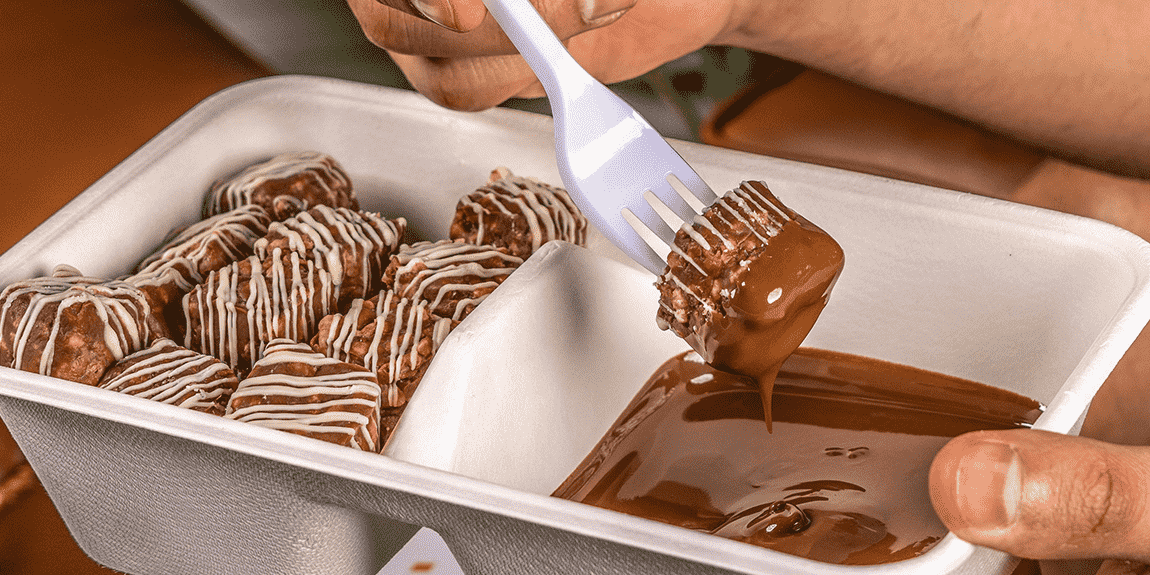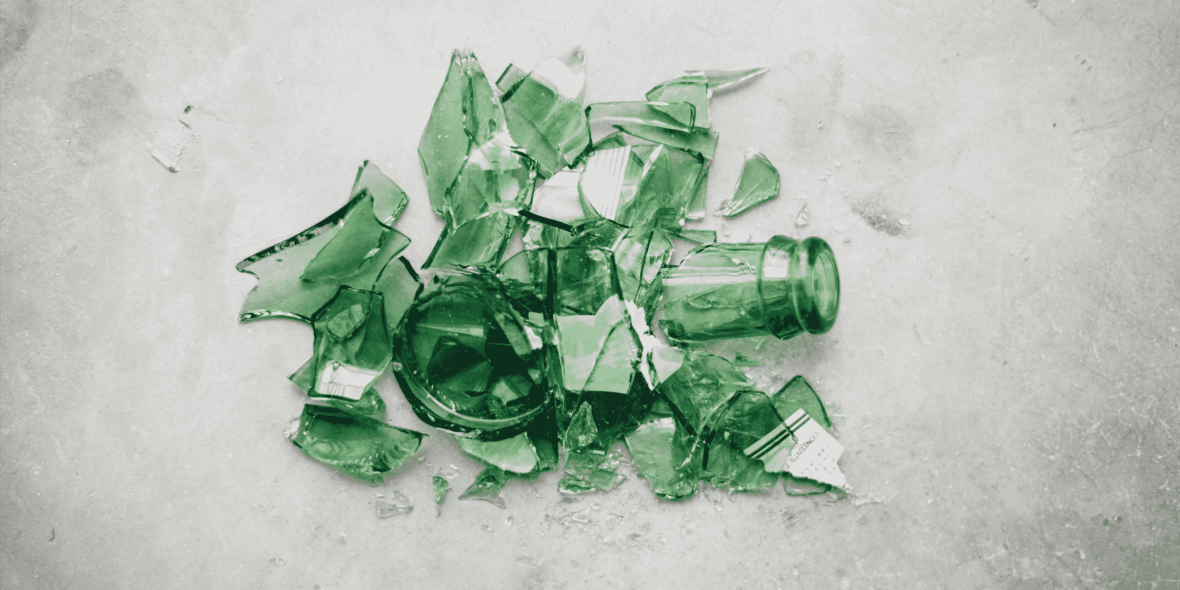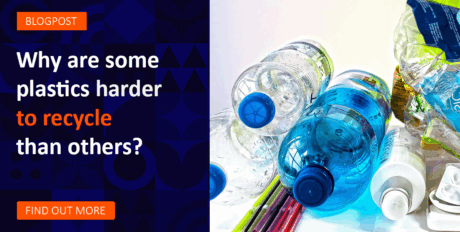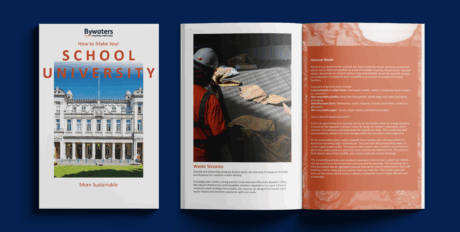Contact us today for your Free Quote
The UK recycles only 45% of its waste: Are you making these common mistakes?
Recycling is easy, so why is the UK only recycling 45% of its waste? Many people are unsure which items can technically be recycled and which items have to be placed in general waste.
It’s not just us saying it, a study by Circular suggests that 25% of respondents don’t feel educated enough to bin items correctly. But wait there’s more, 42% of respondents felt that there were so many ‘misconceptions and myths’ around recycling that they’re not confident they’re doing it properly.
In this article, we will break down common recycling mistakes, as well as sustainable alternatives to disposal.
Before we begin, we wanted to note that Bywaters is London’s leading waste management company, and we’re here to help you recycle right. Visit our Sustainability page to find out more about our comprehensive eco-strategies for our clients and how they may benefit you.
Now, let’s dive in and find out some of the most common recycling mistakes and how to avoid them.

Number 1: Contamination and food waste
While the saying “clean your plate” encourages finishing your food, many Brits mistakenly place food-contaminated containers in the recycling bin. Clean off what you eat off. If a container is smeared with food, it will likely contaminate the waste it’s in. This food residue can contaminate other clean recyclables, causing it to be labelled as general waste, causing the entire batch to be spoiled and ultimately incinerated instead of recycled.

Number 2: Recycling black plastic and infrared
Scientists predict that there may be more plastic than fish in the ocean by 2050. To stop this, recycling companies in the UK have invested in machinery that can separate waste instantly, utilising infrared technology to identify and sort different plastic types based on their unique light-absorbing properties. However, the infrared used to detect and sort different types of plastic doesn’t detect dark plastics properly. This means that even if you do everything right when recycling, your items may still end up in general waste.
When shopping, look for products with clear or brightly colored plastic packaging whenever possible.

Number 3: Practice the ‘Reuse’ in Reduce, Reuse, Recycle
Plastic bags are a common household item, but how often do we end up with a drawer overflowing with them?
Save money and the environment by reusing bags (and other items). Many supermarkets have take-back schemes offering incentives for returning unwanted bags. Recycling is the act of repurposing items for others. If you can repurpose items yourself, you are part of the solution.
We wrote an article further breaking down the Waste Hierarchy and other relevant sustainable alternative practices to inform our readers. Click here to check it out.

Number 4: Broken or not, can you recycle glass?
Did you know? That 11% of people wrongfully assume that lightbulbs can be recycled in any regular bin?
We’ve heard of all the fantastic things glass can be turned into when recycled. The narrative is usually given without context, so, understandably, many Brits tend to use any recycling bin provided to dispose of glass. It’s important to know what can and can’t be recycled at home; glass should be recycled through glass recycling services. Unlike bottles and jars, some drinking glasses often contain a different type of glass that can contaminate a recycling batch.
Always check your local council’s guidelines for accepted glass items to ensure you’re recycling effectively.
At Bywaters, we have prevented over 2.3 million Kgs of CO2 emissions through our sustainable recycling operations. Click here to find out more how we do this.

Number 5: When segregating items, pay attention to the pieces and labels
Lastly, it’s essential to pay attention. Toys, instruments and more tend to have many parts to them. It’s important to take apart items before recycling them. Our rule for food also applies to other products; an item is not defined by the majority of its components. If a toy is made up of more recyclable items than non-recyclable ones, that is still enough for it to be incinerated rather than recycled. To manage the waste of an entire nation, items are put through high-speed machinery. These machines must distinguish between recyclable and non-recyclable items in under a second; therefore, toys and small things can’t always be distinguished or separated.
You made it this far, here are a few useful sources for you…
Recycling is one of the most important practices we can adopt for a more sustainable planet. Not only does it help us reduce our environmental impact, it also saves us money. Yet many people don’t recycle because they don’t have access to a recycling bin or don’t know how to recycle correctly. Our Resources page has a wide range of guides and documents to help inform you on adequate practices on the matter.
Moreover, our Bywaters Waste Training Course helps you test your recycling knowledge, testing you on topics such as preventing contamination and segregating items properly.
If you are a business based around London and are keen on improving your sustainability performance and waste management, Bywaters is here to help you reach this goal. Click here to get in touch with us today.
More posts:
Valentine’s Day: History, Tradition, and Its Modern Impact
This post traces the evolution of Valentine’s Day from ancient Roman rituals to a global commercial event. It highlights the holiday’s hidden environmental impact and offers a guide to celebrating sustainably through “Circular Romance” and waste reduction.
Read morePlastic Recycling: Why Are Some Types Harder to Process Than Others?
Some plastics recycle easily, while others are difficult or impractical to process at scale. This article explains why material type, packaging design, contamination and recycling infrastructure all play a role, and what businesses can do to improve plastic recycling outcomes in the UK.
Read moreThe Ultimate Guide For a Sustainable School and University
Download The Ultimate Guide For a Sustainable School or University. Get the roadmap to cut costs, reduce your carbon footprint, and boost your ESG profile with 5 core pillars.
Read more




